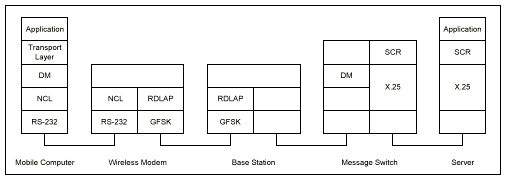|
RAM Mobile Data |
RAM Mobile Data was formed as a venture between RAM Corporation and BellSouth to provide wireless data services in the U.S. and Canada. RAM Mobile Data operates a network based on Mobitex technology. Mobitex was first deployed in Sweden in 1986. Service is currently available throughout much of Europe and the U.S., although the number of applications and users of RAM are quite small.
Mobitex protocols are controlled by the Mobitex Operators Association and are publicly available. Mobitex protocols, however, are unique to Mobitex and are not industry-standard networking protocols.

RAM, like ARDIS, is best suited for applications involving short messages. With typical response times exceeding four seconds, interactive sessions are not generally practical over RAM.
RAMís U.S. network consists of 1000 base stations operating on a cellular basis in a hierarchical network consisting of local switches, regional switches, a main exchange, and a network control center. Base stations typically use two or three channels, with each 12.5 kHz channel supporting a raw bit stream of 8 kbps. Actual throughput is about 4 kbps. X.25 is the primary protocol used in the RAM backbone network as well as for connecting hosts, servers, or gateways to the network.
CDPD has much better performance than RAM for a number of reasons. CDPDís airlink operates at 19.2 kbps compared to RAMís 8 kbps. Furthermore, CDPD uses faster links in its backbone infrastructure.
Figure 2 shows the protocols used within a mobile-to-server connection over RAM.
Mobitex Asynchronous Communications Protocol (MASC) is the layer that communicates with the wireless modem. Mobitex Packet (MPAK) is the Network Layer protocol. At the Transport Layer, RAM offers a protocol called Mobitex Transport Protocol (MTP1). MASC, MPAK and MTP1, although effective protocols, are all unique to the RAM environment.


| Send comments to webmaster Copyright © 1997 Derek Mc Donnell. All Rights Reserved. Last updated 07-Apr-1998. |
 |